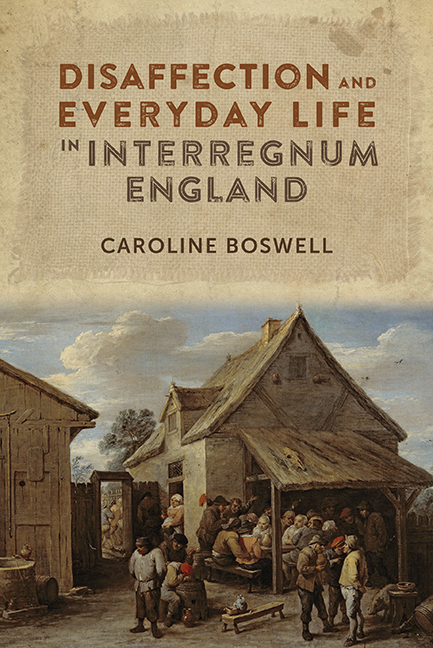Book contents
- Frontmatter
- Dedication
- Contents
- List of Illustrations
- Acknowledgements
- List of Abbreviations
- Introduction
- Part I Sites of Disaffection
- Part II Objects of Disaffection
- 3 Meddling Soldiers
- 4 The “Unnatural” Excise-man
- 5 The Rise of the “Fanatic”
- Conclusion
- Bibliography
- Index
- STUDIES IN EARLY MODERN CULTURAL, POLITICAL AND SOCIAL HISTORY
3 - Meddling Soldiers
from Part II - Objects of Disaffection
Published online by Cambridge University Press: 23 August 2019
- Frontmatter
- Dedication
- Contents
- List of Illustrations
- Acknowledgements
- List of Abbreviations
- Introduction
- Part I Sites of Disaffection
- Part II Objects of Disaffection
- 3 Meddling Soldiers
- 4 The “Unnatural” Excise-man
- 5 The Rise of the “Fanatic”
- Conclusion
- Bibliography
- Index
- STUDIES IN EARLY MODERN CULTURAL, POLITICAL AND SOCIAL HISTORY
Summary
On the evening of 27 September 1655, Ambrose Mitton visited Steven Atkinson's alehouse in Slaidburn, Yorkshire with fellow local William Fletcher to discuss some “business”. The newcomers joined a company of drinkers already gathered. Two of the crew were traveling soldiers, and witness testimonies suggest Mitton knew of their presence before he ventured in. Almost immediately the company engaged in an aggressive conversation over religion. Hostile from the start, Mitton allegedly asked the soldier John Phillips whether he was “a Quaker, Anabaptist or an Independent”. Mitton's friend Fletcher claimed that it was the soldiers who demanded Mitton tell them his religion, stating that they “were Quakers and soe would live and dye”. Regardless of its origins, the heated discussion – charged with the effects of a few flagons of ale – quickly turned violent. Phillips threw a trencher at Mitton, who in turn launched himself at the soldier, calling him “rogue” and other “ill names”. Unable to watch his fellow soldier treated thusly, Matthew Ridley entered the scuffle, which shortly devolved into a wrestling bout on the floor. In the midst of the struggle, two of their fellow drinkers, Isabel Bernaud and Reginold Parkinson, snatched Ridley's sword to prevent any real harm. Bernaud later returned the sword to Ridley who used it to stab Mitton, causing a fatal wound. Ridley was ultimately indicted for murder, though he would escape before charged.
The clash between Ambrose Mitton and the soldiers, Phillips and Ridley, is an example of the tensions that developed between civilians and soldiers throughout civil war and interregnum England. The presence of soldiers in spaces of sociability presented people like Mitton with the opportunity to express frustration over unwelcome changes in their community to men who represented the excesses of the revolution in church and state. Depositions of the struggle at Steven Atkinson's home suggest that Mitton was hostile to the soldiers’ religious beliefs, and his classification of Ridley and Phillips as dangerous religious sectarians demonstrates one of the many ways in which civilians associated soldiers with undesirable consequences of new policies – in this case the toleration and proliferation of radicalism.
- Type
- Chapter
- Information
- Disaffection and Everyday Life in Interregnum England , pp. 123 - 164Publisher: Boydell & BrewerPrint publication year: 2017

